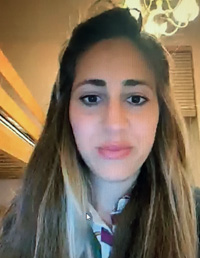


SAN DIEGO — The Netflix miniseries Unorthodox, about a woman who leaves her husband, casts off the ways of the Satmar Hasidim, and seeks to rebuild her life in the secular world, drew Zoomcast rebuttals on Monday night from a first cousin of the author upon whose 2012 memoir the series was based, as well as from educators and rebbetzins of the Lubavitcher Hasidim, better known as Chabadniks, here in San Diego County.
Joining the Zoom session from the Williamsburg neighborhood of Brooklyn, where there live numerous Satmar Hasidim, was Sarah Bercovic, 29, who is four years younger than author Devorah Feldman. Having gone to the same schools as her first cousin, and at one time having left the Satmar community to later return, Bercovic said that the Netflix miniseries departed significantly from Feldman’s actual story in order to “Hollywoodize” it. For example, the series had Devorah, renamed as “Esther Shapiro” and portrayed by actress Shira Haas, flying from New York to Berlin, not knowing she was pregnant, but this never occurred, she said. Furthermore, the series had Feldman’s mother living as a lesbian in Berlin, but, according to Bercovic, Feldman’s mother never lived in Germany.
(My niece, Heather Rothstain, telephoned me from Orange County after the Zoomcast, and said not only was the plot line of the TV series different from Bercovic’s recounting of the events of Feldman’s life, it also didn’t follow the facts as laid out in the book, Unorthodox: The Scandalous Rejection of My Hasidic Roots.)
While the dramatization seemed to Bercovic to have intentionally focused on the negative and restrictive aspects of women’s lifestyles in the Satmar community, Bercovic said because of her own experiences, she understood why her cousin–from whom the entire family is still estranged–may have felt repressed.
Under its late grand rebbe, Rabbi Joel Teitelbaum, the sect adhered to traditional concepts of female modesty: for example, said Bercovic, school girls were not to show any part of their flesh below their necks, which meant wearing special stockings so no skin would be seen between the hems of their dresses and the top of their shoes. Secular clothes, such as blouses or shirts with English language logos, were forbidden. Pointing to the unbuttoned top button of her blouse, she said even such a modest display would rain down disapproval from the Satmar. Because of such minor transgressions, she said, gossips labeled her as less than an outstanding member of the sect — a verdict that reduced her prospects for a good arranged marriage. Eventually, she did marry, became pregnant, and divorced all within a year, prompting her to leave the community to experience the secular world. She dated non-Jews, and temporarily rejected her Judaism, but felt a spiritual hole within her. Meeting members of the Chabad community, who accepted her without question, eventually brought her back to Judaism, and now she lives in Williamsburg, where she follows her own Jewish life style while remaining in contact with her large family.
“It’s not all black and white,” she commented on several occasions.

Devorah Raskin, director of the Chabad Youth Center of Rancho Santa Fe, not only interviewed Bercovics, but also interviewed the rebbetzins (wives and co-spiritual leaders of Chabad rabbis) and other educators within the Chabad movement, about some of the practices depicted in the Netflix series, which, non-Hasidim might have questions about. Throughout the program, it was pointed out that while both Satmar and Lubavitch are Hasidic sects that share a joy in Torah learning, they also have some notable differences. For example, Chabad is very pro-Israel, while the Satmar are anti-Zionist. Chabad specializes in outreach to Jews of all kinds, whether secular or religious. Satmar is much more insular.

Leah Fradkin, the Judaic director of the Chabad Hebrew Academy, dealt with the issue of the differing roles of men and women in Orthodox Judaism, of which Hasidism is a branch. She said that Chabad teaches that the true center of Judaism is not the synagogue, but rather the home, where the woman is a dominant force. Men need to pray at the synagogue, she said, in order to attain the high level of spirituality with which women are already blessed. While the men do that, women attend to other duties, including maintaining concepts of family purity, making challah, and lighting the Shabbat candles — all of which affect the spiritual and physical well-being of the Jewish family.

Sorah Leah Eber, who performs and teaches music to girls, was asked about the Netflix series showing strong disapproval by the Satmar of music performance by lone females. She responded that Orthodox Judaism has the concept of kol isha — literally meaning a woman’s voice — that teaches that men can be sexually aroused by the sound of a female singing, and thus are discouraged from listening to women singers. While she avoids singing in front of men, to “avoid putting a stumbling block” before them, all-female concerts are arranged for other women. Some of the songs are recorded, including hers, and may be found on social media.

Rochel Smoller was asked about “matchmaking” in the Jewish community. In Unorthodox, the mother of the prospective bridegroom surreptitiously observed Esther while she shopped at the grocery store, agreed to a match with Esther’s grandparents, and thereafter the bride and groom were introduced for a brief meeting. That process is not at all like matchmaking within the Chabad community, where, she said, single persons say what they are looking for in a match, which triggers a community-oriented process involving a lot of networking to introduce prospective couples. Smoller also commented on mehitzas that separate men from women at synagogue services. She said they are not meant to insult women, or to use a Civil Rights Era metaphor, to send them to the back of the bus, but rather to permit both men and women to concentrate on their prayers without distracting each other.

Dini Polichenco, rebbetzin of Chabad of Carmel Valley, was asked about one memorable scene in Unorthodox when Esther’s head was completely shaven, making room for a sheitel (wig.) She responded that while this may occur among the Satmar, Chabad women, who also wear wigs, typically cut their underlying hair to whatever style they prefer. She said the idea that a woman should cover her hair can be found in the Bible, when women who are being interrogated about misdeeds have their hair covering removed. From that, she said, one adduces that covering the hair has important spiritual meaning. While Esther had a drab, even ugly sheitel, in Unorthodox, most sheitels today are attractive and stylish.

Meirav Boudjnah, rebbetzin at Chabad at San Diego State University, was asked about the rules of mikvah, with which she is familiar because of her work at the nearby Mikveh Israel. She responded that the mikvah, or ceremonial bath, reinforces the spiritual holiness of a woman; emerging from its waters is like a rebirth. Women typically go to the mikvah to cleanse themselves after their menstrual periods and before resuming sexual relations with their husbands.

Sura Leider, rebbetzin of Chabad of University City, was asked why there seem to be so many rules in Judaism. She responded with a story. Suppose someone gives you a computer, but doesn’t tell you how to use it, not even how to turn it on, or turn it off. You can stumble your way on your own through a learning process, or you can read the manual, or have someone teach you. She said God gave humanity the world, along with the Torah, to show how best to use it.

Nechama Eilfort, rebbetzin of Chabad of La Costa, was asked about whether sexual intimacy between husband and wife is frowned upon, as a viewer of Unorthodox might believe. To the contrary she said, couples touch each other, have foreplay, enjoy a sense of dignity within their intimacy, but all this is done in private. She noted that in Judaism a husband has a duty to pleasure his wife, and she said it is a law, when enjoying intimacy, to turn off the lights in a room, so couples can concentrate on

touch.
Chanie Yelin, rebbetzin of Chabad of San Marcos, was asked if divorce was possible among the Hasidim. She responded that it is permitted, however, marriage in Judaism is so sacred, and so special, it normally is not going to be thrown away. Great efforts are made to avoid that.
*
Donald H. Harrison is editor of San Diego Jewish World. He may be contacted via donald.harrison@sdjewishworld.com